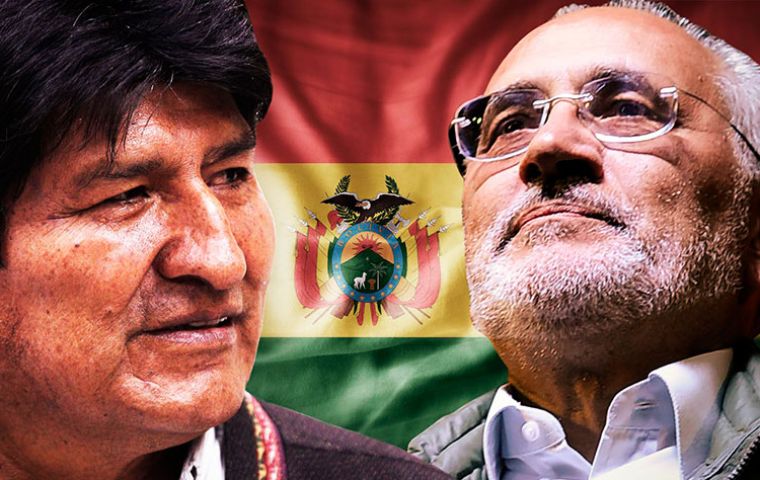MercoPress. South Atlantic News Agency
Bolivia presidential election: Evo Morales will face a run-off vote next 15 December
 Morales had 45% of the vote to 38% of former President Carlos Mesa, partial results from Sunday's presidential vote showed. (Pic Infobae)
Morales had 45% of the vote to 38% of former President Carlos Mesa, partial results from Sunday's presidential vote showed. (Pic Infobae)  If Morales, already Latin America's longest serving leader, wins in the run-off vote on 15 December, he will be in power until 2025.
If Morales, already Latin America's longest serving leader, wins in the run-off vote on 15 December, he will be in power until 2025. Bolivian President Evo Morales will face a run-off vote for the first time after failing to secure a fourth consecutive term at an election. Morales had 45% of the vote to 38% of former President Carlos Mesa, partial results from Sunday's presidential vote showed.
Bolivia's first indigenous leader has been in power since 2006. Morales is a divisive figure, praised for his social policies but criticized for defying term limits.
If Morales, already Latin America's longest serving leader, wins in the run-off vote on 15 December, he will be in power until 2025.
These were the most uncertain elections for Mr. Morales, with many people angry with his insistence on running again. In effect in a referendum in 2016, Bolivians rejected his suggestion to ditch the presidential term limits.
But his Movement for Socialism (MAS) party took the matter to the constitutional court, packed with Morales cronies, which ruled in the president's favor, allowing him to stand for a fourth term.
Bolivians have also criticized his environmental policies, after forest fires that destroyed four million hectares of land in eastern Bolivia.
Many question whether a decree passed by the president, which quadrupled the amount of land farmers are allowed to clear for agricultural production, contributed to the blazes.
Morales, who has won all his previous terms in the first round, needed 40% with a 10-percentage-point lead over his nearest rival or more than 50% of the votes to win outright.
President Morales, 59, has been widely praised for growing the Bolivian economy and, at the same time, cutting extreme poverty.
Many indigenous Bolivians continue to back him, saying Carlos Mesa - who is running for the Civic Community (Comunidad Ciudadana) political alliance - embodies the white Bolivian elite and question his commitment to the poor.
In the election campaign, Mesa argued that with oil and gas revenue declining, Bolivia needed to be “more sensible and rational” in the way it spends its money, especially as the country has a fiscal deficit of 7.8% of GDP.
But his message of curtailing spending has not proven popular with poor voters who have seen steady improvements to their quality of life under President Morales.




Top Comments
Disclaimer & comment rulesCommenting for this story is now closed.
If you have a Facebook account, become a fan and comment on our Facebook Page!